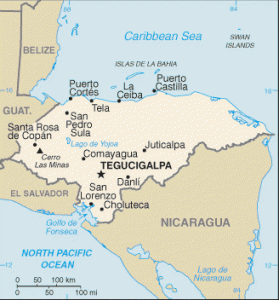After U.S. Drug Enforcement agents killed several innocent Honduran civilians in a botched raid earlier this month, some expected drug war efforts in Central America would relent. But American intervention has doubled down.
 That deadly raid was part of a growing U.S. effort to intercept drug shipments in and out of Honduras, which has become a hub of cocaine traffic in recent years. And despite the unjustified killings of civilians and the bad publicity, officials are liking what they’re seeing.
That deadly raid was part of a growing U.S. effort to intercept drug shipments in and out of Honduras, which has become a hub of cocaine traffic in recent years. And despite the unjustified killings of civilians and the bad publicity, officials are liking what they’re seeing.
“In the first four months of this year, I’d say we actually have gotten it together across the military, law enforcement and developmental communities,” William R. Brownfield, the assistant secretary of state for international narcotics and law enforcement affairs told the New York Times. “My guess is narcotics traffickers are hitting the pause button. For the first time in a decade, air shipments are being intercepted immediately upon landing.”
But the gains perceived by the coercive bureaucrats whose jobs depend on improvements in the drug war effort are momentary at best. For years when fighting cartels in Mexico, clamping down on one route and one gang, meant another route and another gang achieved success in another province.
The gains are there to be made and prohibition – even violently enforced – has proved a very poor way of undermining the narcotics trade and its traders. In fact, it has emboldened them, incentivizing them towards building their own armies.
But the drug war, as fought by Washington, also has other negative corollaries. The Obama administration chose to support the illegal military coup in Honduras in 2009, which ousted democratically elected Jose Manuel Zelaya. The coup leaders continued to receive U.S. aid as American military and DEA presence in the country began to expand. This began a descent into what Dana Frank, professor of history at the University of California, called “a human rights and security abyss.”
Washington’s efforts to clamp down on drug enforcement in Mexico led President Calderon to militarize the conflict, which ended up causing the deaths of about 50,000 in a matter of years. The State Department’s own report on human rights said this month that U.S.-trained security forces in Mexico have “engaged in unlawful killings, forced disappearances, and instances of physical abuse and torture” in the U.S.-led war on drugs.
“We have seen over the years that whenever the military interfaces with the populace, incidents of human rights abuses go way up,” said George Withers, a senior fellow at the Washington Office on Latin America. “We’re concerned that the U.S. is encouraging the use of the military for police work.”
So the U.S. is doubling down on its drug war in Central America, even though these efforts are a proven failure which have consistently brought havoc on the innocent populations in the region. But apparently they’ve got to do something with all the money being freed up from the wars in Iraq and Afghanistan winding down.


